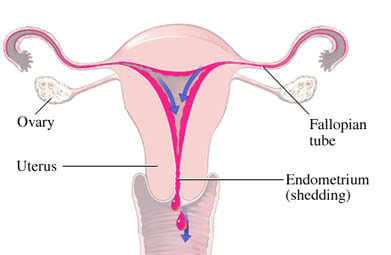Amenorrhea Information
Click here to scroll to the list of available medications ↓
Amenorrhea means the absence of menstruation. Amenorrhea occurs after menstruation has begun and can strike anywhere during reproductive years. Primary Amenorrhea refers to patients who have not received their menstrual period by the age of 16. In most cases, amenorrhea doesn’t imply anything, and is not typically associated with any major disease. While most patients believe that they may be pregnant, patients who have abstained from sexual intercourse for a long period of time may be highly disconcerted over the absence of a regular period.
The basic symptom of amenorrhea is the failure to menstruate. In primary amenorrhea, it means the failure to begin menstruation by age 16. In secondary amenorrhea, it means the failure to menstruate for a minimum of 3 months. Sometimes patients who are experiencing amenorrhea may also experience a milky white discharge from the nipples, hair loss, headaches, changes in vision, and excessive facial hair growth.

There can be numerous causes associated with amenorrhea. Primary amenorrhea can be caused by chromosomal abnormalities, a hypothalamus problem, pituitary disease, missing reproductive organs, or a structural abnormality in the vagina. Secondary amenorrhea may be caused by pregnancy, contraceptives, or breast feeding. The most common cause for women who are not pregnant or breast feeding is a side effect of an eating disorder. Low body weight can trigger hormonal changes to the body which ceases the menstrual cycle. Other causes can include stress, medication, chronic illness, excessive exercise, hormonal imbalances, pituitary tumor, thyroid problems, uterine scarring, and premature menopause.
It is rare that amenorrhea is associated with any type of life threatening illness or disease. Diagnostics regarding finding the cause of amenorrhea may take quite a bit of time and ample testing. Diagnosing amenorrhea is not difficult, as it simply means the absence of an expected period. Once pregnancy, eating disorders, and medication and contraceptive causes have been ruled out, the physician will need to perform tests beginning with discovering the hormonal balance of the patient’s body and testing further from there.
Blood tests, the introduction of hormones which should inspire bleeding, imaging tests to search for tumors, and minimally invasive surgical procedures to check the internal organs may all be part of the testing process.

Some cases of amenorrhea mysteriously clear up on their own just as mysteriously as their onset. Of course, not all patients are quite that lucky and treatment options will vary depending on the cause of the amenorrhea. Amenorrhea caused by eating disorders, excessive exercise, and stress can be cleared up through treatment for the underlying problem. Amenorrhea that is caused by other conditions such as vaginal deformities requires surgical procedures to correct the deformity. Thyroid disorders and pituitary gland problems can usually be corrected through medications.
Amenorrhea caused by eating disorders is one of the first signs that the patient is in a significant health crisis. The body is not prepared to be perpetually underweight and amenorrhea is often the first sign before other internal organs are significantly affected by an eating disorder. Patients with eating disorders require prompt treatment, usually in a facility that specializes in eating disorders, and round the clock medical care.
Amenorrhea is not a disease, and while healthy women are impatiently awaiting the return of their monthly menses, it is usually a symptom of a health issue. Amenorrhea, while not considered a health issue on its own, should always be thoroughly checked out by a physician or gynecologist in order to maintain the proper health of the patient.
Some women are relieved to not have to deal with the monthly menses and do not wish for it to return. Women who are healthy should be receiving a monthly period and it is important that whether it is desired or not, the period be encouraged to return. The monthly cycle is a sign of women’s health.